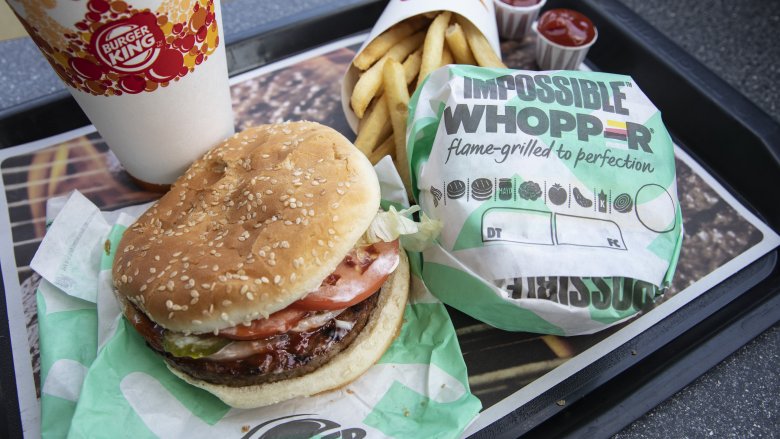Are Plant-Based Burgers Really Any Healthier?
If there's one food trend that's just completely taken off in 2019, it's that of the meaty-tasting plant-based burger. The Impossible Burger, the Beyond Burger, and numerous imitators can now be found absolutely everywhere, from trendy bistros to fast casual chains to fast-food restaurants (although if you're planning to order the new Impossible Whopper from Burger King, be warned that they might not be vegetarian after all). Heck, they'll probably even be popping up on the menu at your kid's school cafeteria this fall.
Plant-based burgers wouldn't be this popular if they didn't taste good, so that's definitely one reason people are ordering this new breed of meatless patty. Another reason is that it's better for the planet if we all dial back on our carnivorous consumption. And yes, there are numerous ethical and religious reasons for adopting a plant-based diet. But if you're chowing down on these plant-based burgers thinking that they must be much healthier for you than the meat-based kind... well, maybe not so much.
For one thing, have you ever really looked at the ingredients for these types of burgers? The Impossible and Beyong Burger ingredient lists read more like a lab experiment, including things like methylcellulose, cultured dextrose, soy leghemoglobin, soy protein isolate, pea protein isolate, and potassium chloride. Probably not what you were expecting, right? Dr. Linda Shiue, Director of Culinary Medicine at Kaiser Permanente in San Francisco, doesn't sound too impressed, either, recently telling U.S. News, "I don't consider meatless burgers to be a health food per se, as they are a highly processed food." In other words, grabbing an Impossible Whopper instead of a classic Whopper does not make you a health food junkie.
As to how the nutrition data stacks up — a burger made from 80 percent lean beef will have 280 calories and 9 grams of saturated fat. The Impossible Burger has 240 calories and 8 grams of saturated fat, while the Beyond Burger has 250 calories and 6 grams of saturated fat. So, okay, maybe these plant burgers are a tiny bit healthier than beef, but not to any spectacular level. In fact a turkey burger beats both plant-based options, coming in at just 220 to 240 calories and just 4 to 5 grams of saturated fat. Healthier yet are the old-school veggie burgers that aren't even trying to taste meaty. These tend to be just 150 to 160 calories, and have only about 1 gram of fat. What's more, they contain actual recognizable grains and vegetables like quinoa, carrots, and mushrooms instead of whatever "pea protein isolate" may be.
One area in which Impossible and Beyond Burgers are quite similar to their meat-based counterparts is that of protein content, with 19 to 20 grams per burger matching the protein levels typically provided by both beef and turkey burgers (and more than double that of traditional veggie burgers). They do, however, have much higher sodium levels than either type of meat burger, with 370 milligrams for the Impossible and 390 for the Beyond, as compared to 65 to 75 milligrams for beef and 95 to 115 for turkey — although slightly lower than the 400+ milligrams of sodium that can be found in some traditional veggie burgers.
The verdict overall? Plant-based burgers are obviously great for the health of the planet, and eating them as a way to cut down on your red meat consumption is also a good thing. But in the words of nutritionist Lisa Drayer, writing for CNN Health: "If you're eating these burgers simply in the name of saving calories, or sodium, or saturated fat, you might want to rethink your decision." Dr. Shiue agrees, pointing out that eating processed foods is linked with negative health outcomes including weight gain, cancer, and (eek!) early death. She suggests that a better alternative to eating commercially-prepared plant-based burgers is to try making your own veggie burgers. They're simple, tasty, and genuinely healthy — not so Impossible, after all.
